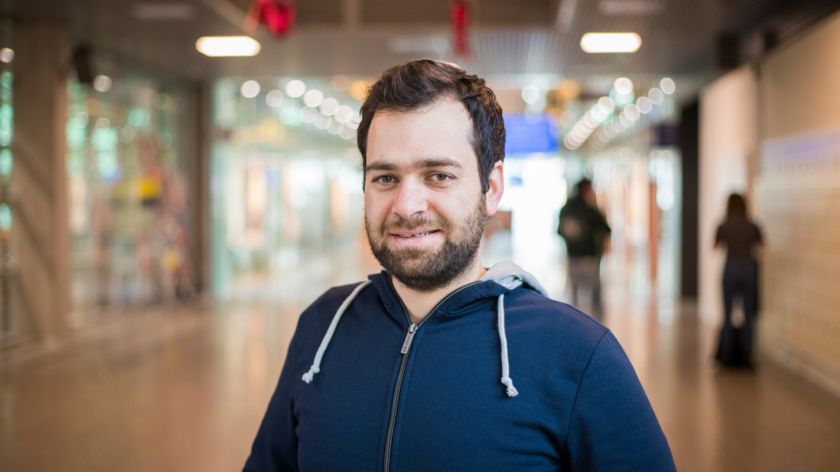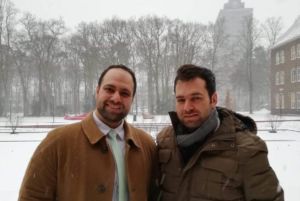Courses taught in English or in Dutch if you come from Syria?
-
 Yasser Hammoudeh. Photo: Tom Hessels
Yasser Hammoudeh. Photo: Tom Hessels
Two Syrian brothers. One has just completed the English-language Master’s programme in Molecular Chemistry in Nijmegen, and his brother is studying Mathematics, a programme taught in Dutch. What is more attractive if you come from a country like Syria: courses taught in Dutch or in English?
The Foundation for Refugee Students UAF is not happy with the increase in the number of English-language Bachelor’s programmes in higher education. It advises its students to choose a Dutch-language Bachelor’s instead of one taught in English. Refugee students have to learn Dutch in order to meet the integration requirements, find work and make a place for themselves in Dutch society. In addition, mastering English at a high level is a bridge too far for most of them, said the Foundation recently on Voxweb.nl.

But how do refugee students themselves experience this situation? Take the brothers Hussein (32) and Yasser (28) Hammoudeh, who both have studied at the Nijmegen beta faculty. Hussein did a Master’s in Molecular Chemistry and now works at the Quality Control department of an international company in Eindhoven. Yasser is currently a second-year student of Mathematics in the Huygens Building. He studied computer science in Syria but switched to Mathematics in the Netherlands because he enjoys that subject more.
Daily discussions
The answer isn’t that simple. After his Bachelor’s in Syria, Hussein did an English-language Master’s (in Lebanon), which made his second English-language Master’s in Nijmegen easier. He was awarded his diploma last month. Hussein doesn’t think that he would have been better off with a Dutch-language course of studies. ‘In my field, all of the publications are in English. Without a good basis in English, you can’t understand the research.’ But the English-language Master’s didn’t help his Dutch language skills. Because of his study assignments, he was unable to finish the Dutch course that he was taking. He never received his B2 diploma. Now that he works, he sometimes finds this difficult, he says on the telephone.
‘I work at an international company. All of the emails and reports are in English. But people at the company speak Dutch; the conversations during the breaks, the discussions about work are all in Dutch. Logical since almost all of my colleagues are Dutch. And the German colleagues also speak good Dutch.’ He has a hard time in these discussions because his Dutch isn’t good enough. And he knows that his colleagues could easily make themselves understood in English. ‘Their English is very good. But they just don’t, and I understand that: they feel more comfortable in their native tongue.’
‘Then I have to try to figure out what those Dutch terms could mean in English’
‘Then I have to figure out what those Dutch terms might mean in English.’ But it’s different for his younger brother. ‘Yasser came to the Netherlands a year after me, but he already speaks the language better.’ Yasser is following a Dutch-language programme. He studies Mathematics at Radboud University, one of the few beta programmes that is still taught in Dutch. But curiously enough, he’s not completely happy about this. ‘I would have preferred a course of studies in English,’ says Yasser in the canteen in the Huygens Building. Before beginning his studies in Mathematics, Yasser attended a two-hour Dutch course each day at
Radboud in’to Languages. Add to that one to two hours of homework each week and the picture is clear: Yasser knows a lot of Dutch words and sentences, but when he started to study Mathematics he was suddenly confronted with another foreign language
Headache
‘The teaching is in Dutch, but most of the professional literature and course books are in English. During the lectures, the lecturers give the technical terms in Dutch. At home I have my English books with their English terms. Then I have to try to figure out what those Dutch terms could mean in English. The lecturers sometimes refer to the English terms during their lectures, but it costs me a lot of time and energy to switch from Dutch to English. My problem, of course, is that these are two foreign languages for me.’
Asking a question in a workgroup in which an English-language article is being discussed is almost impossible for him. ‘The question has to be in Dutch because I don’t want to be the odd man out. But if I’ve just read it in English, I can barely formulate the question in Dutch. This gives me a headache.’
Yasser worked very hard his first year to pass his courses. This year he allows himself to go to a café now and again with friends. But his studies are still too demanding to be able to enjoy them, Yasser says. He hopes that will soon change. After his Bachelor’s, he intends to study technical mathematics in Eindhoven or Delft. Meanwhile, his Dutch is fine. ‘A year and a half ago, I couldn’t carry on a conversation about mathematics in Dutch. Now I can.’



